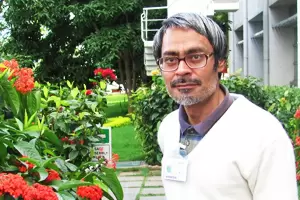Tying up with builders of concrete jungle to save the real garden

01-October-2010
Vol 1 | Issue 5
Take two steps ‘backwards’ to sustain our environment rather than two steps forward into oblivion. This is the message that Dr Krishna MB has for the administrators of the burgeoning city of Bangalore, where glass and concrete seems to be the norm.
No, Krishna is not a slogan shouting environmental activist. He is a qualified ornithologist. Though an avid bird watcher, Krishna has been of late concerned over the manner in which the gardens in the ‘erstwhile garden city’ are being transformed. Obviously he finds a connection between the vanishing birds and the change in garden spaces.
Over time, gardens in the city have undergone a transformation. The fruit and flowering trees growing in gay abandon have given way for manicured and empty gardens, most often filled with rolling expanses of lawn and interspersed with flowerbeds. Trees, if any, are confined to the periphery and most often belong to exotic varieties that do not support bird or insect life.
 |
|
Krishna Speak: enough of ornamental gardens, let’s get real and bring the trees and sparrows back
|
Realising that this was one of the reasons for the sudden disappearance of the common sparrow and several other birds that chirped in Bangalore, Krishna decided to tie up with one of the biggest multinationals Bangalore - Robert Bosch, who were building a new plant in Coimbatore. “I met Mr Friedhelm Pickhard, the managing director of Bosch, and pointed out to him how the manicured garden were devoid of people and biodiversity. Though they came with high maintenance, at the end of the day they have little functional and utility value, serving no ecological or human needs. Bosch is very forward thinking and in no time hired me to plan their new corporate parking area in Coimbatore,” Krishna recalls.
In the booklet called, ‘Composing Corporate Garden Landscapes’ that Krishna has released along with Robert Bosch Engineering and Business Solutions Limited, he hopes to shift the emphasis from the manicured to a semi-rustic landscape. Rather, go back to the original concept of planting trees and not just keeping them in avenues in the city. “Trees collectively alter the microclimate of an area, providing insulation, reducing dust and air pollution, altering humidity and making outdoor spaces more human friendly. There is a growing body of evidence that demonstrates how green spaces can offer lasting economic, social and environmental benefits,” says Krishna.
When choosing trees Krishna states that the choice should be sound since they take a long time to grow. “If they are flowering, check if the colour of the flower blends with the colour of the building. Scented flowers can add to the perfume in the area besides the regular plus points of a tree. But most importantly trees provide food and shelter for birds and a variety of wildlife. Nectar attracts birds, butterflies and bees. Bats, birds and squirrels feed on all types of fruit. Insects, however, are particular with species and will only inhabit certain trees,” says Krishna.
Krishna was also one of the members to start [email protected], an email fora for birders, whose doubts he clarifies. He is keen on bringing back all the birds back to Bangalore by creating the right eco-system even as the city threatens to turn into a concrete jungle.














